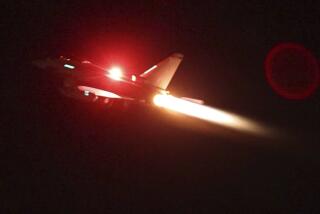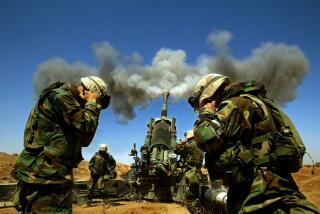Let’s Roll Against Saddam Hussein
- Share via
To a young lieutenant on the ground just 100 miles south of Baghdad, President George H.W. Bush’s decision to end the Gulf War prematurely in 1991 made perfect sense. The Iraqi military was devastated, civilians were suffering, Saddam Hussein’s grip on power seemed to hang by a thread and the inevitable casualties from attacking Baghdad seemed too high a price to pay.
Things have not turned out as expected. Hussein is still in power and the Iraqi population continues to suffer. Although we have little direct evidence since United Nations inspections ended, Iraq’s nuclear, biological and chemical capabilities probably are intact. With Hussein’s inclination toward retribution and weapons of mass destruction at the ready, Iraq--part of an axis of evil or not--stands out as a devastating terrorist threat. The former President Bush and I were wrong. We should have taken out Hussein when we had the chance. A decade later, President George W. Bush faces choices similar to those his father did, and there is growing consensus that this time, Hussein must go.
The “talk, not act” crowd has a long list of reasons to continue to deploy diplomatic means--U.N.-led inspections, economic sanctions and political isolation--instead of go against Iraq. They say that given the lack of evidence of Iraqi culpability for the Sept. 11 attacks, a military assault on Iraq would lack international support, and that an effective campaign would be more costly and difficult than in Afghanistan, particularly without support from Iraq’s neighbors. They say that a stable, democratic post-Hussein regime would be difficult to achieve, and that an assault might prompt further terrorist attacks on the U.S. or its allies.
While unilateral U.S. action would raise eyebrows abroad, success would go a long way toward rekindling international support. Regional allies like Turkey, Jordan, Kuwait and even Saudi Arabia will fall in line if U.S. action is swift with minimal civilian casualties. France, Germany, Russia and others will forgive American action once the threat of Hussein is gone and the new Iraq offers more commercial opportunities.
U.S. armed forces are more capable today of crushing Iraq’s military. Advanced technologies, intelligence resources and special operations forces are far superior to what they were in 1991. Meanwhile, the poorly equipped Iraqi army is one-third the size it was, the air force is virtually nonexistent and the loyalty of Iraqi troops is fragile. While significant ground forces would be needed, they would be a fraction of those deployed in 1991.
Left unchecked, Hussein’s ability to deliver weapons of mass destruction will grow. The terrorists so shockingly successful on Sept. 11 would have been more devastating had they been armed with nuclear or biological weapons. While attacking Iraq head-on might increase the likelihood of Hussein lashing out, it also would force him to focus on self-preservation, making an orchestrated attack on the U.S. or allied soil more difficult.
Recent success in Afghanistan, lingering outrage over Sept. 11 and the president’s popularity have created the “perfect storm” for decisive action. The administration must quickly build the case with key allies, particularly in the Persian Gulf, for why taking the war to Iraq is critical to their security and ours. The U.S. must provide more substantial support to the Iraqi National Congress and other possible participants in a new Iraqi regime. The cause is noble and just. Military objectives are achievable and clear. In the haunting words of terrorist victim Todd Beamer, “Let’s roll.”
More to Read
Sign up for Essential California
The most important California stories and recommendations in your inbox every morning.
You may occasionally receive promotional content from the Los Angeles Times.













